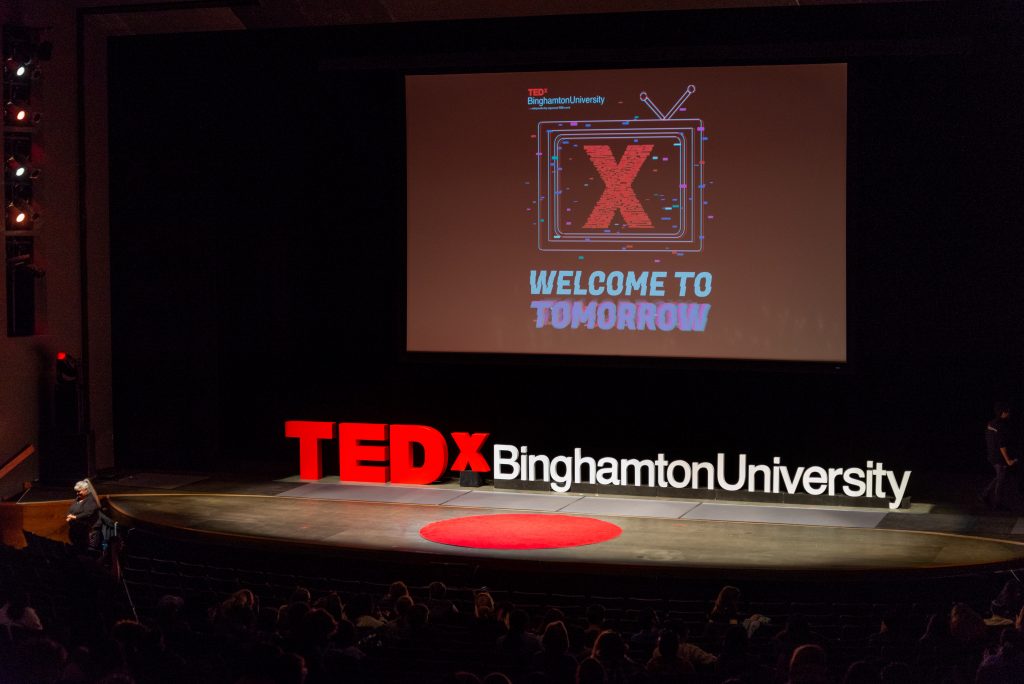This past Sunday, TEDxBinghamtonUniversity held its 12th-annual conference in person for the first time in over two years.
This year’s theme was “Welcome to Tomorrow,” with the goal of shedding light on a “new normal” that has set in worldwide as society deals with and adapts to the challenges that have been presented over the last couple of years, according to the TEDxBinghamtonUniversity website. Six speakers were featured, sharing their stories and opinions on various topics such as community violence, the Olympics, activism and medical crises.
One of this year’s speakers was Daniel Adeyanju ‘14, founding director of Kura Labs, a free technology program that “upskills recent early careerists in DevOps and site reliability engineering,” according to the TEDxBinghamtonUniversity webpage. He discussed how students can innovate their career by using the four P’s — people, projects, problem-solving and packaging.
Other speakers included Greg Hill, a professional skier, filmmaker and ski guide with the Association of Canadian Mountain Guides, and Paul Turner, the Rachel Carson professor of ecology and evolutionary biology at Yale University, who discussed the antibiotic resistance crisis.
Elisheva Ezor, a sophomore double-majoring in mathematics and business administration, gave a talk titled “Tales of a 6th Grade Revolutionary” and discussed what activism meant to her, as well as her passion for standing up for what she believes in — which she discovered through a movement she started in middle school regarding the fairness of the spelling bee.
“All of those conversations that we were having about the inequity of the spelling bee was like the sixth grade equivalent of recognizing systemic ableism,” Ezor said. “And all of the kids who had been laughing at my friend for getting her word wrong, ended up holding signs and joining our movement. We were creating something long-lasting and important. That spelling bee is the first time I experienced seeing something that I knew was wrong and actualizing a plan to fix it.”
Ezor’s talk was followed by a 15-minute intermission, in which the Binghamton Flow Arts Club performed a display of motion, music and lights.
Following the intermission show, there was a fencing demonstration featuring Courtney Hurley, a three-time Olympian and 2012 Olympic bronze medalist in fencing. Following her demonstration, Hurley discussed how the COVID-19 pandemic had affected her relationship with the sport.
Hurley began her talk describing how she had felt the Olympics would be the most important competition of her life when she was growing up, and how in many respects, it had been. She also said that taking part in the Olympics made her aware of the issues that come along with such a large competition. Among such issues were lack of proper financial earnings among Olympians, corruption in politics and poor mental health that is not properly addressed among athletes.
The final speaker was Casey Boston, a graduate student pursuing a Master of Social Work. In his talk he primarily covered the mental health effects of community violence, especially among Black adolescents. He also addressed the anxiety, depression and post-traumatic stress that can come from community violence exposure at a young age.
“Community violence is like a disease,” Boston said. “It affects all racial and ethnic groups. [Community violence] has been linked to academic failure and high levels of distress. Exposure to community violence is public shootings, gang fights, stabbings, homicides, robbery, burglary, narcotic sales and many more. When an individual is repeatedly exposed to these violent events, it is going to take a toll on their mental health. This kind of exposure is strongly associated with antisocial behavior, risky behavior, aggression, substance abuse, sleep problems and suicidal thoughts.”
Boston included some of his own personal experiences growing up and dealing with community violence, which he said took a toll on his mental health as well. He encouraged making mental health just as much of a priority as physical health. After he graduates, Boston said he hopes to provide mental health therapy to both adolescents and adults.
Boston discussed the importance of a support system, especially for those who have been exposed to large amounts of community violence.
“Research suggests that when members of a community support each other, [they] in turn will develop resilience,” Boston said. “Attributes that are associated with resilience are emotional well-being, inner drive, future focus, physical health and better relationships. In a resilient community, maladaptive behaviors like internalization and aggression begin to decrease, and it gives the opportunity for our adolescents to develop positive behaviors like goal setting, focusing on their futures and developing a good mindset.”



